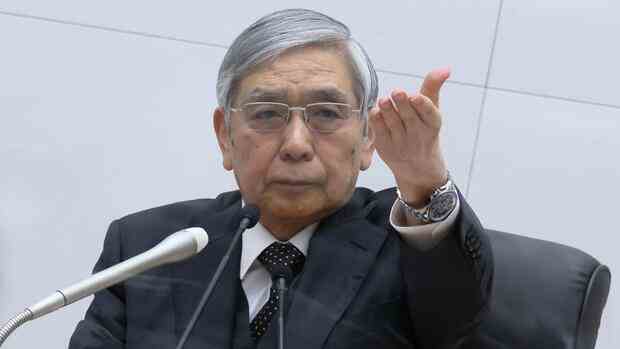No country has taken monetary policy to such an extreme as Japan.
(Photo: Bloomberg)
The Bank of Japan is powerful. So powerful that for years it has been overriding the rules of the financial market more than any major central bank in the world. It does not allow the yields on the important 10-year Japanese government bonds to form in the market. Through its own purchases and sales, it has so far kept it within a mini-corridor defined by it below 0.25 percent.
The Bank of Japan (BoJ) calls this instrument yield curve control, which is due to the desperate fight against deflation in the country and the fear of rising interest rates. The current increase in the yield limit to 0.5 percent was overdue.
>> Read here: Bank of Japan surprises with strategy change – Asian markets react violently
Because there was no longer any talk of deflation in Japan, with the consumer price index rising by 3.6 percent recently. Prices in the third largest economy in the world have not risen so significantly for 40 years.
Top jobs of the day
Find the best jobs now and
be notified by email.
In the end, even the BoJ was unable to buck the global trend. The US Federal Reserve, the ECB in Frankfurt, the Bank of England – all have raised interest rates sharply this year – only Tokyo has remained undeterred in its ultra-loose monetary policy.
This gap has meanwhile sent the yen to a 32-year low against the dollar. In addition, the market for Japanese government bonds has dried up, there is no longer any liquidity because nobody wants to buy the bonds with such low interest rates.
Tokyo’s Munchausen experiment: The central bank keeps financing the state
The BoJ now holds more than half of all outstanding bonds from the heavily indebted state. In order to keep capital market interest rates low, BoJ governor Haruhiko Kuroda bought state bonds on an unprecedented scale – and in doing so drove the monetary financing of the state budget to the extreme.
In the coming year, the BoJ will have to show how it can take further steps out of this extreme monetary policy strategy without unleashing chaos on the financial markets. With more than 250 percent of annual economic output, the Japanese government is in debt – a lone record.
One thing is certain: the state cannot afford an abrupt rise in interest rates. What’s more, the entire economic system – from real estate loans to corporate investments – is no longer used to the fact that interest rates can rise.
Kuroda has started the turning point with his current step. He leaves the accomplishment to his successor. Because Kuroda will step down in April next year.
More: These global risks loom if the Bank of Japan hikes interest rates
